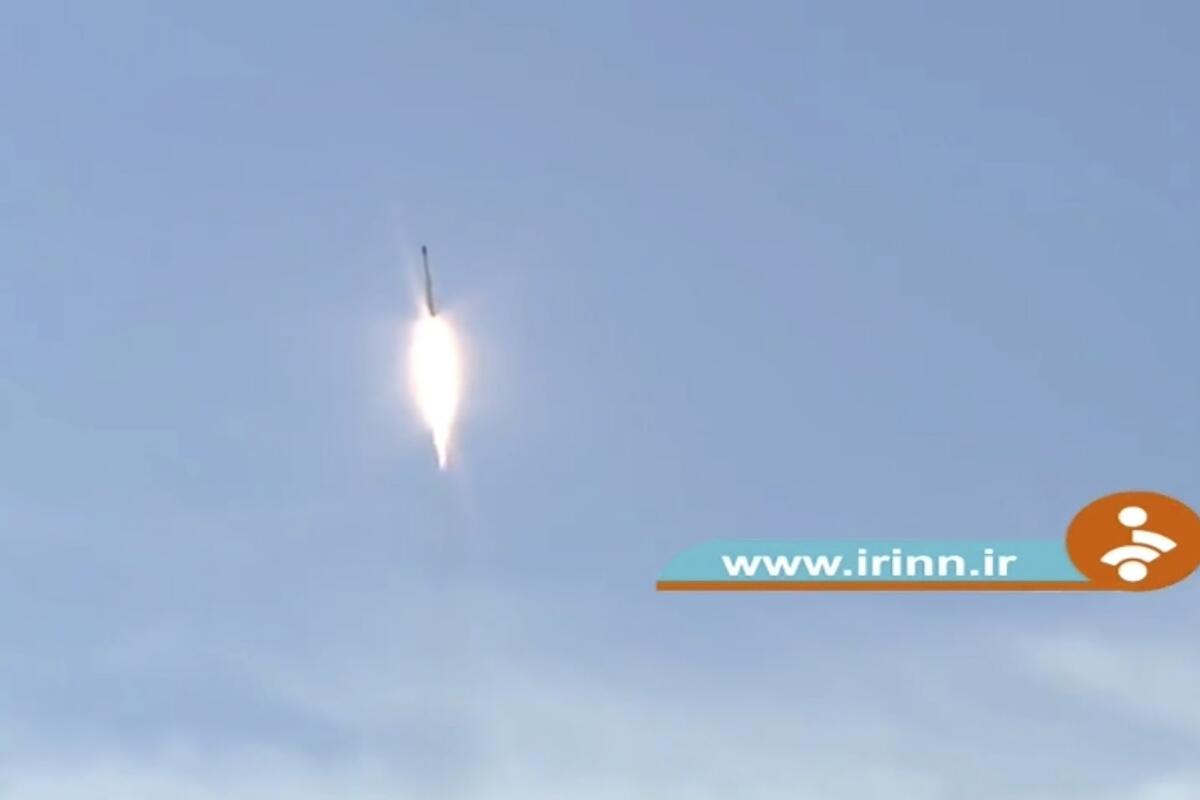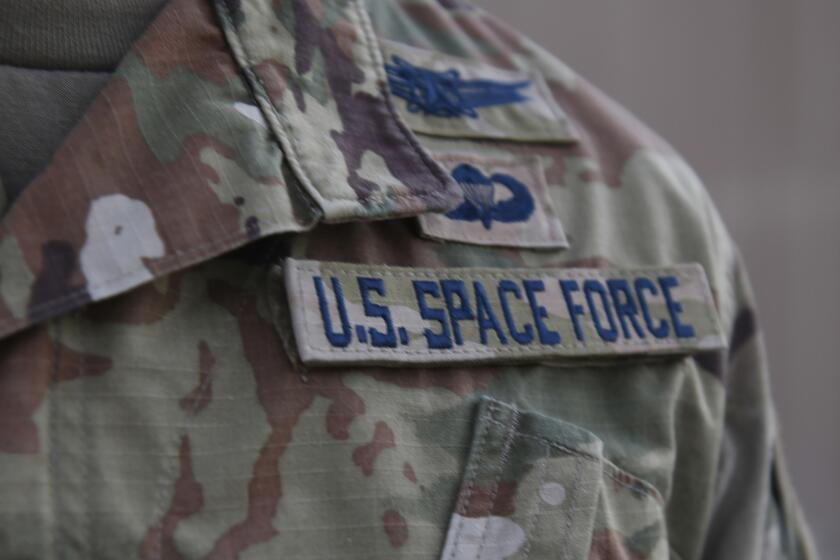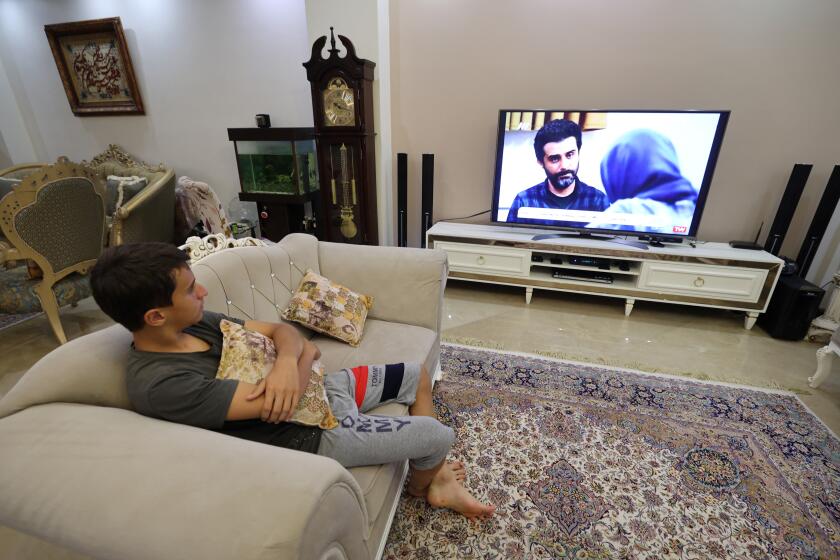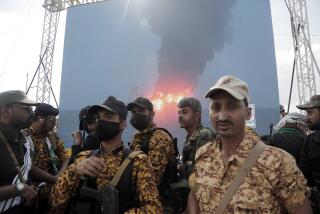Iran says it launched a rocket with a satellite carrier into space

- Share via
TEHRAN — Iran launched a rocket with a satellite carrier bearing three devices into space, authorities announced Thursday, without saying whether any of the objects had entered orbit around Earth.
It was not clear when the launch happened or what devices the carrier brought with it. Iran aired footage of the blast-off against the backdrop of negotiations in Vienna to restore Tehran’s tattered nuclear deal with world powers. An eighth round of talks had been underway this week and is to resume after the New Year’s holiday.
Previous launches have drawn rebukes from the United States. The U.S. State Department, Space Force and the Pentagon did not immediately respond to requests for comment.
Ahmad Hosseini, a Defense Ministry spokesman, identified the rocket as a Simorgh, or “Phoenix,” rocket. He said the three devices were sent up 290 miles.
Hosseini was quoted as saying that the “performance of the space center and the performance of the satellite carrier was done properly.”
But hours later, Hosseini and other officials remained silent on the the status of the objects, which suggests that the rocket had fallen short of placing its payload into the correct orbit. Hosseini offered a speed for the satellite carrier that state-associated journalists reporting on the event indicated wouldn’t be enough to reach orbit.
The U.S. Space Force has set up a squadron in Qatar, the newly formed service’s first foreign deployment.
Iran’s civilian space program has suffered a series of setbacks in recent years, including fatal fires and a launchpad rocket explosion that drew the attention of former President Trump.
Iranian state media recently offered a list of upcoming planned satellite launches for the Islamic Republic’s civilian space program. Iran’s paramilitary Revolutionary Guard runs its own parallel program that successfully put a satellite into orbit last year. Hosseini described the launch announced Thursday as “initial,” indicating more are on the way.
Iranian TV aired footage of the white rocket — emblazoned with the words “Simorgh satellite carrier” and the slogan “We can” — shooting into the morning sky from Iran’s Imam Khomeini Spaceport. A state TV reporter at a nearby desert site hailed the launch as “another achievement by Iranian scientists.”
The blast-offs have raised concerns in Washington about whether the technology used to launch satellites could advance Iran’s ballistic missile development. The U.S. says such satellite launches defy a United Nations Security Council resolution calling on Iran to steer clear of any activity related to ballistic missiles capable of delivering nuclear warheads.
‘Gando,’ a ‘Homeland’-like hit TV series in Iran, is a sophisticated ploy by ultra-conservatives to torpedo delicate nuclear talks with the West.
Iran, which long has said it does not seek nuclear weapons, maintains that its satellite launches and rocket tests do not have a military component.
Announcing a launch as nuclear negotiators meet in Vienna aligns with Tehran’s hard-line posture under President Ebrahim Raisi, a recently elected conservative cleric.
New Iranian demands in the nuclear talks have exasperated Western nations and heightened regional tensions as Tehran presses ahead with atomic advances. Diplomats have repeatedly raised the alarm that time is running out to restore the accord, which collapsed three years ago when America unilaterally withdrew under Trump.
From Vienna, Iranian nuclear negotiator Ali Bagheri Kani told Iranian TV that he hopes diplomats pursue “more serious work to lift sanctions” when nuclear talks resume next week. He described negotiations over the past week as “positive.”
Washington, however, has thrown cold water on Tehran’s upbeat assessments. State Department spokesman Ned Price told reporters earlier this week that “it’s really too soon to tell whether Iran has returned with a more constructive approach to this round.”
News Alerts
Get breaking news, investigations, analysis and more signature journalism from the Los Angeles Times in your inbox.
You may occasionally receive promotional content from the Los Angeles Times.
Iran has now abandoned all limitations under the agreement, and has ramped up uranium enrichment from under 4% purity to 60% — a short, technical step from weapons-grade levels. International inspectors face challenges in monitoring Tehran’s advances.
Satellite images seen by the Associated Press suggested a launch was imminent earlier this month. The images showed preparations at the spaceport in the desert plains of Iran’s rural Semnan province, about 150 miles southeast of Tehran.
Over the past decade, Iran has sent several short-lived satellites into orbit and in 2013 launched a monkey into space. But under Raisi, the government appears to have sharpened its focus on space. Iran’s Supreme Council of Space has met for the first time in 11 years.
More to Read
Sign up for Essential California
The most important California stories and recommendations in your inbox every morning.
You may occasionally receive promotional content from the Los Angeles Times.












